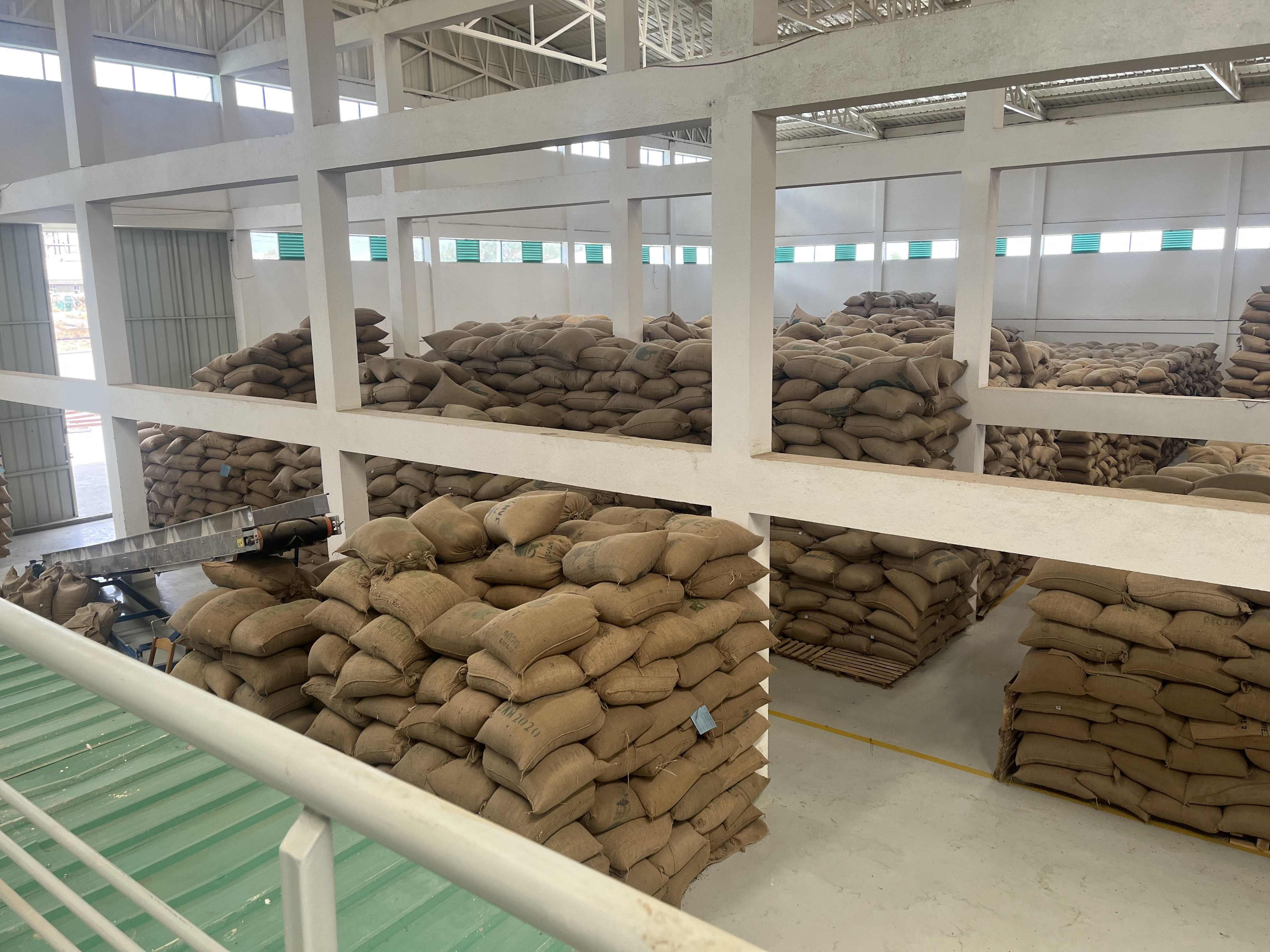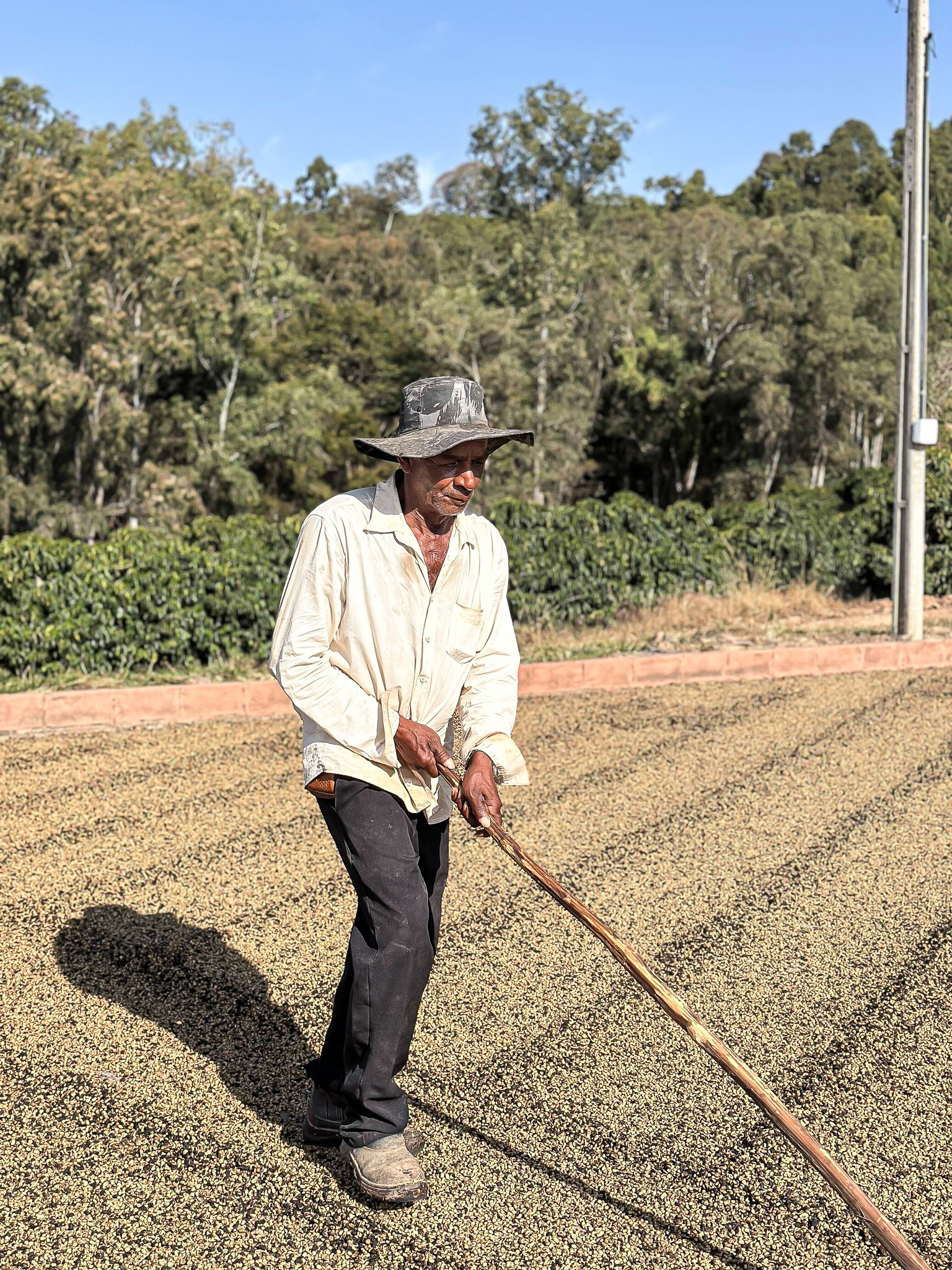Uganda

Naturals, washed, and some special preps sourced from Eastern Uganda.
As an origin with so much potential, we started sourcing from Uganda in 2018. If processed well, the quality of Ugandan coffee can be incredible. With centralised processing and drying facilities, we have developed sourcing programs in the East. We have seen the quality rise and have been working on new product concepts. These coffees deserve a place in the specialty industry and are different from the normal, home-processed coffees that are often inconsistent in quality and traceability.
Harvesting season
Almost all year
Arrival times
July – August, January – April
Quantities
10 - 20 bag microlots, 100 + bag communal lots
Packaging
60kg Grainpro bags
Cultivars
Mixed SL varieties, SL 14, 28, 34, Bourbons, Catimors
Processes
Naturals and washed, various fermentation methods
Flavour profiles
Classic naturals, wild and boozy naturals, classic washed, fruity washed
Usage
Filters and espressos, special editions
Shelf life
We can never guarantee more than 6 months after arrival for any coffees.
In Uganda, planning before the harvest season is mandatory. We plan with our suppliers, commit to volumes, pre-contract, and when possible, pre-finance to ensure the output we’re seeking. We have detected great potential in naturals and special preparations. We focus on developing protocols to deliver new flavour concepts on scale, both for naturals and washed coffees. After quality, our main criteria when buying is traceability and the premiums we pay, which must go directly to the producers.
Most coffee in Uganda is home processed, meaning the farmers pick the cherries and either de-pulp it with a hand pulper, or simply dry the cherries on a tarp. We don’t buy home processed coffees as we find them inconsistent in quality and difficult to fully trace. Instead, our buying programmes are based on a centralised processing/drying facility.
Like most origins we work in, we focus on smallholders and establish local partnerships that share the same objective as us: to take Ugandan specialty coffee to the next level. We commit to the coffees we purchase, so that producers are incentivised to invest in their processing protocols. By guiding the producers we work with and establishing the right partnerships, our coffees fall under four main categories: classic naturals, wild and boozy naturals, classic washed, and fruity washed.
Our classic naturals are clean and distinctive with typical mature berry flavours, pronounced fermentation towards strawberry and raspberry, as well as fruity cacao.
The wild and boozy naturals are more lactic and/or alcoholic, often anaerobic or semi-anaerobic fermentation. Fruity, mature stonefruit, sometimes yoghurt-like, with everything from candy-like tutti-frutti to banana and sweet spices like cinnamon, cardamom, ginger and herbs.
Our classic washed lots are clean with good depth, mild florals, currant and grape-like, mild herbal, bright and clean.
The fruity washed lots are fully washed with different levels and methods of fermentation, sometimes anaerobic or semi-anaerobic, more layers of fruit and mild fermentation flavours, often reminiscent of good honey processed coffees.
Our smallholder coffees come from farmers who commonly own less than a hectare of land. For the washed coffees, our farmers deliver cherries to a small washing station who process and dry the coffee on-site, or move it to a central drying space. For naturals, the farmers either deliver cherries to a bigger centralised drying station that specialises in naturals, or to local cherry collection centres, before the coffee is transported to the drying facility. Washing stations deliver the parchment to exporters who cup and grade the coffee, dry mill, and export the finished green coffee.
For our estate coffee, the producer has their own washing station/mill and drying space at. They process all their own coffees here, and buy cherries from outgrowers (neighbouring smallholders). The coffees are picked and immediately transported to the wet mill for pulping, fermentation, and drying. They are then moved to an exporter’s warehouse where they are milled and shipped according to our instructions. The producer owns the coffee outright, and pays the exporter for services like dry milling, grading, bagging, quality control, documentation, and logistics.

A step-by-step overview

Similar to Kenya, there are a good number of SLs, most commonly SL14, SL34, and SL28. Bourbon seems to be common too, especially in the West. Depending on the altitudes and area, there are also a lot of Catimors. Most of the farmers have coffee gardens and are not generally aware of what varieties they are growing. The coffees come from smallholder communities, mostly from farmers working with less than 1 hectare each.
On average, farmers cultivate less than 1500 trees per hectare, and one tree typically produces a quantity of cherries equal to 100 – 200 grams of green coffee. There is almost constant harvest in Uganda if you look across the different regions, and it will vary based on the rains and weather. Mbale in the East has the main season from November – February, and a fly crop from around May – June. The West and South West have one season from March – May, and another from August – November. This can always shift a little depending on the region, weather and the altitude of the farm.
The farms are managed by family members, and located in parishes, or communities. The family cares for the plants and picks the cherries themselves. Usually they will also grow crops for their own consumption, and there are a few farmers with more land. Each parish is the administrative centre for between seven and twelve villages. These villages can be home to as few as 200 people. Farmers often work communally with a leader for each group of farms.
Our Ugandan coffees are mostly from different parishes, with the occasional lot from a communal washing station. The 'potato defect’ can occur in Ugandan coffees, but it is much less prevalent than in countries like Rwanda and Burundi. The Potato Taste Defect (PTD) is caused by a small bug called Antestia that feeds on the cherry and leaves some bacteria, creating a metabolic reaction.
Farmers can reduce the risk by using pesticides and by thoroughly sorting their cherries. In collaboration with our producers, we have implemented improved picking and intense sorting procedures at every stage of processing, drastically reducing the occurrence of PTD.
Processing methods in Uganda are different, depending on the region.
Naturals in the East: Most of our coffees undergo a semi-anaerobic fermentation. After cherry reception, the coffees are laid out on African beds for pre-drying, and cherries are sorted as they dry. The coffee is then placed in drums or polypropylene bags for additional fermentation. This can last for 12 – 48 hours, after which it is laid on the table. Layers are adjusted accordingly to meet the projected time for final drying, normally 10 – 18 days.
Naturals in the West: These are usually dried without additional fermentation. Coffee cherries are laid out on the bed in layers, depending on the level of fermentation the producer wants to achieve. We have a separate protocol for cherry fermentation under plastic, before the coffees are dried according to standard procedures for naturals.
Washed in the East: Coffees at the washing stations are pulped with eco-pulpers before they are dry-fermented in small plastic or concrete tanks. The coffee is then washed and rinsed before it is dried on raised beds.
Washed in the Southwest: Coffees from the farm are picked and go straight into processing. We have different levels and methods of fermentation both in cherry and in parchment. Cherry fermentation is done on plastic in the open air, or in bags before the coffees are pulped with an eco-pulper and treated like regular washed coffees before they are dried on raised beds.
Regular washed or additional fermentations are also conducted differently. Fresh cherries are harvested and pulped immediately by an eco pulper. They are then either fermented in bags or in regular fermentation tanks for different periods of time, depending on the level of fermentation and flavours we want to produce. All coffees are carefully dried on raised beds, mostly under shade and cover.
Quality
Most coffee in Uganda is home processed, meaning the farmers pick the cherries and either depulp it with a hand pulper, or simply dry the cherries on a tarp. We don’t buy home processed coffees as we find them inconsistent in quality and traceability. Instead, our buying programmes are based on a centralised processing/drying facility.
We identify micro-regions, smallholder farmers and micro estates that go against the traditional views and pushes for higher quality. We know the quality of Ugandan coffee can be amazing if it’s processed well. These coffees deserve a place in the specialty industry and Ugandan producers should have access to specialty premiums.
Transparency
After quality, our main criteria when buying is that the coffees are fully traceable, including the premiums we pay, which must go directly to the producers.
The producer owns the coffee outright, and pays the exporter for services like dry milling, grading, bagging, quality control, documentation, and logistics.
Impact
Unlike other East African origins where it is easy to visit, cup, and select from existing stock lots of specialty coffees, Uganda doesn’t have a selection of good quality coffee just sitting around. You have to plan before the harvest season. We plan with our suppliers, commit to volumes, pre-contract and where possible, pre-finance to ensure the output we’re seeking. There are so many good coffees around, but very little investment has been made in post-harvesting, or in the supply chain in general, so the country has struggled to achieve its full potential. This suits us well, as we love a challenge.
As for most origins we work in, we are focused on smallholders and seek local partners with these relationships. Together we develop processing protocols, and Nordic Approach pre-contracts these coffees, aiming to find a market for these coffees and elevate the origin’s potential.

About the origin
With very few washing stations in the country, home processed coffees dominate the coffee sector, accounting for 85-90% of Ugandan production. Farmers dry their own cherries, often on plastic or tarp. If the coffee is washed, they use a small and simple hand pulper. The inconsistent and low quality of these coffees means they are mostly sold for unsustainably low prices.
There are very few washing stations in Uganda. While big multinationals are investing in washing stations, most farmers prefer to home-process their coffee. Exporters and locals are also hesitant to invest in washing stations, due to a general feeling of mistrust in the industry.
The country’s total production amounts to 4,2 million bags, or 250,000 metric tonnes. There are about 1,7 million households producing coffee, with the average farm size being 0.18 hectares. Around 40% of Uganda’s coffee production is Arabica, which is grown from 1000 – 2300 masl. About 70% of this is processed as natural.
The West and SouthWest, and the East of Uganda are the biggest regions for Arabica production, while the Central region is known for growing Robusta.
Interested in this origin? Talk to your sales rep.




What’s new?
The latest updates delivered to your inbox.
Subscribe to our newsletter for the freshest news on origins, harvests, new producers, our coffee list, and market insight.

.jpg)














.jpg)



.jpg)
.jpg)

